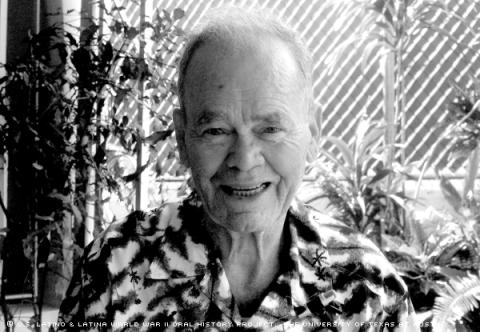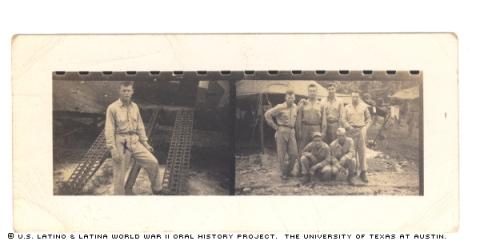

By Juan de la Cruz
Felix López-Santos's early memories of his native Puerto Rico include watching everything float away from his front porch during the big San Felipe storm of 1928. After his Barrio Ceiba was washed away, his family moved to another town, San Lorenzo, where his mother became ill.
Moving to Connecticut seven years later was difficult for López--Santos, but he adapted to the new environment fairly quickly. He attended a predominantly Anglo school and learned English in his classes, where he was the only Latino student.
He was fond of President Roosevelt and vividly remembers the bombing of Pearl Harbor in 1941. One year after the attack by the Japanese, López--Santos was drafted into the Army and was sent to Fort Dix in New Jersey for training. After a few weeks, he was sent to Camp Davis in North Carolina for more basic training. There, he says he witnessed some forms of racial discrimination, but never experienced it himself.
"I remember seeing some colored people refused service at a restaurant," López--Santos said.
He says he wasn’t discriminated against because of his blue eyes and fair complexion.
Traveling across the nation by train, López--Santos arrived at Camp Stoneman near San Francisco to await his voyage to Australia. He and about 3,000 soldiers boarded the USS Grant, heading to a small town off the northeastern coast of Australia called Townsville.
"During this journey we were attacked by an enemy submarine that in turn was sunk by a small destroyer that was escorting us," López--Santos said.
López--Santos' first "combat" experience was an unusual incident that occurred in Australia.
"[A kangaroo] came running, and it seems that he crashed on me, or kicked me and knocked me down!" said López--Santos, smiling. "That was my first incident [overseas]."
In 1944 López--Santos went to Milne Bay and then to the small island of Woodlark, both in New Guinea, where he was in the communications department using telephone wires to contact the troop. He and many others came down with a common ailment known as jungle fever. López--Santos had to take two pills of Atabrin, which gave him a case of jaundice, he said. He also remembers taking six salt tablets daily to prevent dehydration because of the high temperatures in the jungle.
During his stay on the island, López--Santos and his fellow soldiers built a boat for fishing.
"We used dynamite to throw at the school of fish in the water because there were thousands of them, and then we'd take them on the boat," López--Santos said.
His fellow soldiers would frighten off sharks with their rifles, or sometimes grenades, if it were necessary.
"Those fish were delicious," said López--Santos, remembering the taste.
On a trip aboard a Landing Ship Tank heading toward Luzon, Philippines, in the Lingayen Gulf, López-Santos and his troop were close to being hit by a suicide bomber that exploded near their ship. Bombing began on both sides of the LST at 4 a.m., and his ship arrived three hours later on the island of Luzon. He remembers seeing a little girl crying because her family was dead.
"People in the United States and here in Puerto Rico don't know what a war is," said López-Santos of the difficult moments he had during his service. "[People] just don't know what it involves."
He says he remembers the horrible smell of dead, rotten bodies on the seaside after an invasion.
"[It] was a stench of death," López-Santos said.
López-Santos' sister thought he was dead because he rarely wrote home. And when he did write, his letters were censored to be sure not to reveal his location.
"I wanted to write nice things about the small island and describe this place, but everything was cut short and censored," he said.
Through word of mouth, he and his fellow soldiers found out about the atomic bombs that hit the Japanese cities of Hiroshima and Nagasaki in August of 1945.
"There weren't any newspapers or other media outlets to find about what was happening around us," López-Santos said.
He says he always had to depend on fellow soldiers to find out what was going on. One time, he found out a sniper had killed one of his best friends. He still has his military ID tags.
When the war was over in 1945, López-Santos returned by ship to Brooklyn, N.Y., after almost three years on the Pacific Ocean. There, he met his wife, fellow Puerto Rican Emerita Negrón, who was visiting an aunt of hers who happened to be a good friend of his sister. They married a year and three months later and went on to have three daughters, all of whom were born in Brooklyn.
After 56 years of marriage, Emerita still remembers how she felt the first time she met López-Santos in New York.
"I got really nervous," she said, smiling.
López-Santos returned with his family to Puerto Rico in 1954.
Mr. Santos was interviewed in San Juan, Puerto Rico, on December 20, 2002, by Doralis Perez-Soto.

